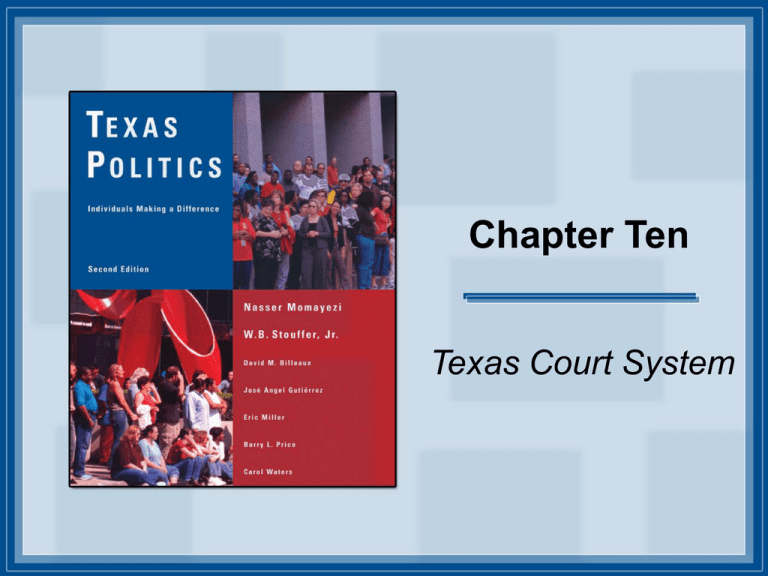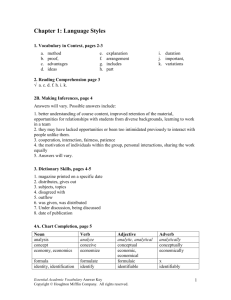
Chapter Ten
Texas Court System
Introduction
• This presentation will allow you to follow
various types of court cases through the
Texas court system.
• This is based on Figure 10.1, so you may
refer to the book if you get “lost.”
• Click on the buttons that represent your
choices, or on the arrows to move from
one slide to the next.
Copyright © Houghton Mifflin Company. All rights reserved.
10-2
Level of Courts
• Before you choose the type of case,
consider that there are three levels of
courts in Texas:
• Local
• County
• State
• So as you follow your case, look for each
level and see where your case is!
Copyright © Houghton Mifflin Company. All rights reserved.
10-3
Types of Cases
• Civil case
• Criminal case
• Dispute between two
parties
• Usually involves a
question of authority or
responsibility
Civil Case
Copyright © Houghton Mifflin Company. All rights reserved.
• Person(s) accused of
violating one or more
laws
• Government must
prove case beyond
reasonable doubt
Criminal Case
10-4
Level of Case?
Local
County
State
Copyright © Houghton Mifflin Company. All rights reserved.
10-5
Level of Case? (Cont’d)
Local
County
State
Copyright © Houghton Mifflin Company. All rights reserved.
10-6
Civil Case
• Local:
• There isn’t much work for many local courts in
this area. Some JP courts perform the “small
claims” function in which the amount in
dispute is small.
• Example: Did you “give” or “loan” your
neighbor your lawn mower?
Appeal?
Start Over
Copyright © Houghton Mifflin Company. All rights reserved.
10-7
Civil Case (Cont’d)
• County:
• If the amount in dispute is over $200, but less
than $5,000 ($100,000 in Courts at law) this is
where your case goes.
• These are obviously more serious disputes,
and sometimes businesses are involved.
• Example: A business sues a former employee
to recover costs incurred by the employee
(like stolen equipment). Appeal?
Start Over
Copyright © Houghton Mifflin Company. All rights reserved.
10-8
Civil Case (Cont’d)
• State:
• These are the most serious cases– divorces,
contested elections, etc.
• The trial court is the local District Court; some
counties have several.
• Businesses are often involved in suing each
other over contracts.
Appeal?
Start Over
Copyright © Houghton Mifflin Company. All rights reserved.
10-9
Civil Case (Cont’d)
• Appeal:
• The Courts of Appeals hears cases from both
the county courts and the district courts.
• In some cases, like divorces, their decision is
final.
• In the rest of the cases, you might appeal.
Appeal?
Start Over
Copyright © Houghton Mifflin Company. All rights reserved.
10-10
Civil Case (Cont’d)
• Final Stop: Supreme Court of Texas
• This is the final court for the state of Texas.
• Their decision is final, and it may take several
months for them to reach a decision in your
case.
Appeal?
Start Over
Copyright © Houghton Mifflin Company. All rights reserved.
10-11
Criminal Case
• Local:
• In municipal courts, cases are violations of
city ordinances, like speeding.
• In JP courts, cases are Class C
misdemeanors.
• These courts generally don’t keep records.
Appeal?
Start Over
Copyright © Houghton Mifflin Company. All rights reserved.
10-12
Criminal Case (Cont’d)
• County:
• These courts hear Class A & B misdemeanor
cases.
• There may be an occasional appeal from a
local court– but that usually means a new
trial.
Appeal?
Start Over
Copyright © Houghton Mifflin Company. All rights reserved.
10-13
Criminal Case (Cont’d)
• State:
• This is the place for felonies– the most
serious of crimes.
• Once again, the trial court is the District Court;
some hear only these types of cases.
Copyright © Houghton Mifflin Company. All rights reserved.
10-14
Criminal Case (Cont’d)
• State:
• One thing to keep in mind about these cases:
• There are TWO levels of punishment:
• Capital
• Non-capital
• So there are two paths for possible appeals
Non-Capital
Appeal?
Capital Appeal?
Copyright © Houghton Mifflin Company. All rights reserved.
Start Over
10-15
Criminal Case (Cont’d)
• Appeal:
• In non-capital punishment cases, these
judges will render their decision on the district
court.
• It is an intermediate step in some cases.
Appeal?
Start Over
Copyright © Houghton Mifflin Company. All rights reserved.
10-16
Criminal Case (Cont’d)
• Final Stop: Court of Criminal Appeals
• Death penalty cases automatically come here.
• An appeal from a Court of Appeals comes
here too.
• It can take nearly 3 years (versus 1 year) to
decide a death penalty case.
Appeal?
Start Over
Copyright © Houghton Mifflin Company. All rights reserved.
10-17
Final Stop
• This is the end of the line (in most cases)
for your case. There are no appeals
beyond the court you just left- its decision
is final.
• You can try your case in federal courts, but
that’s for another course.
Return to
Last Court
Start Over
Copyright © Houghton Mifflin Company. All rights reserved.
END
10-18

